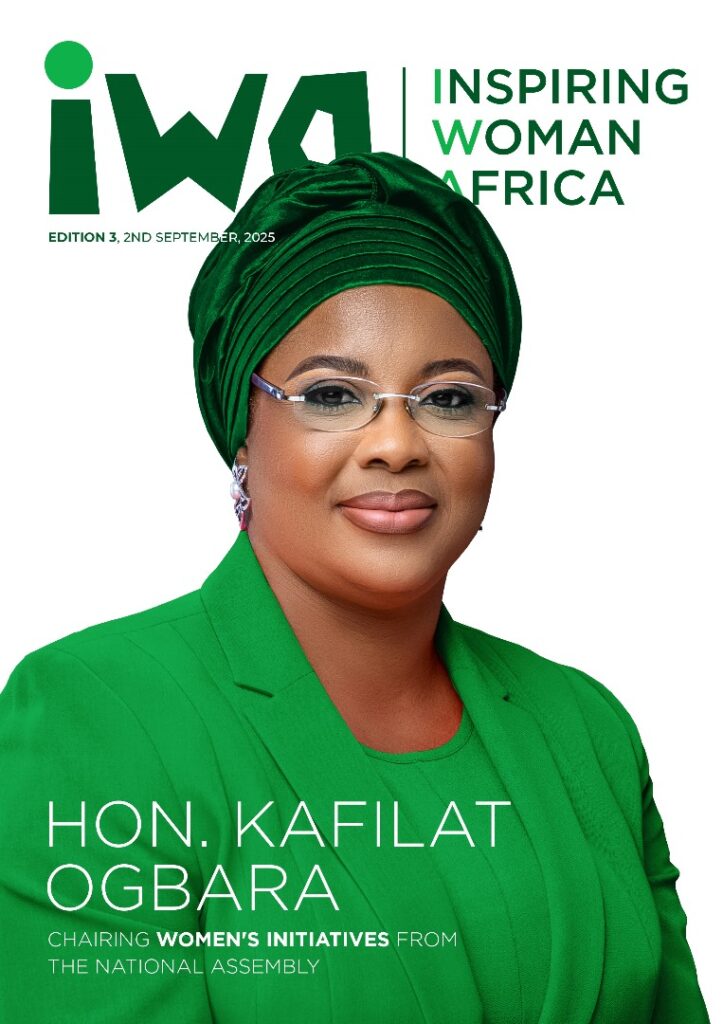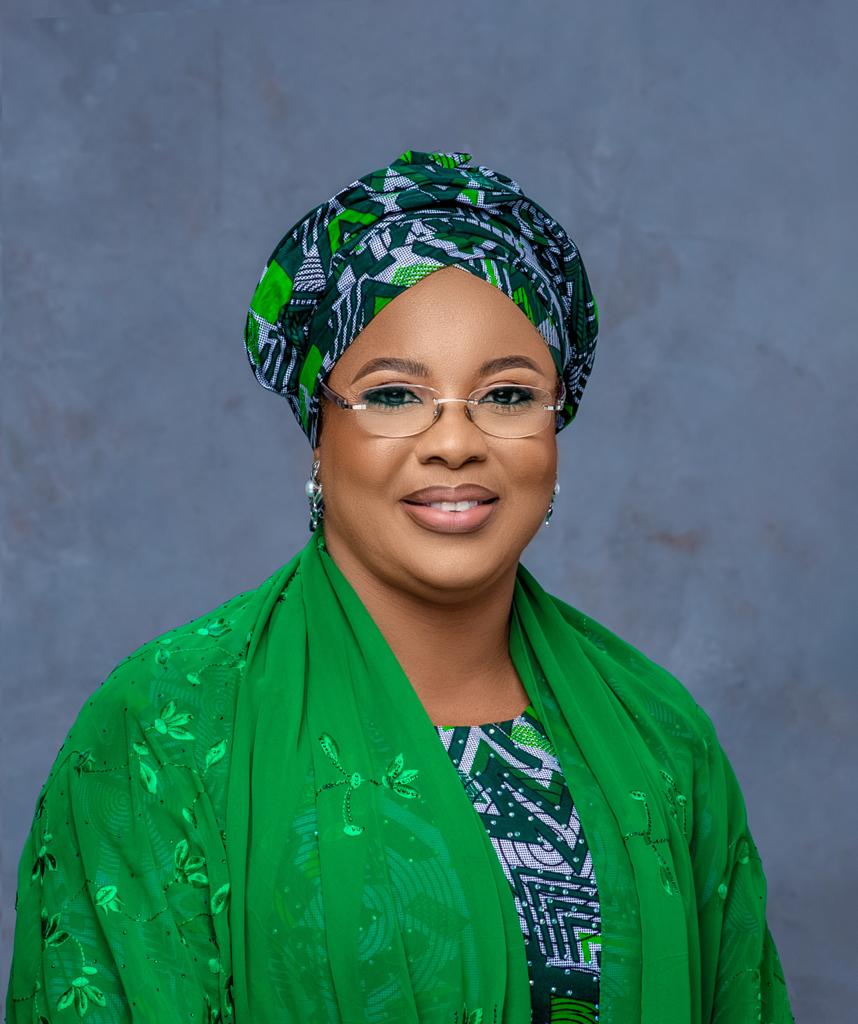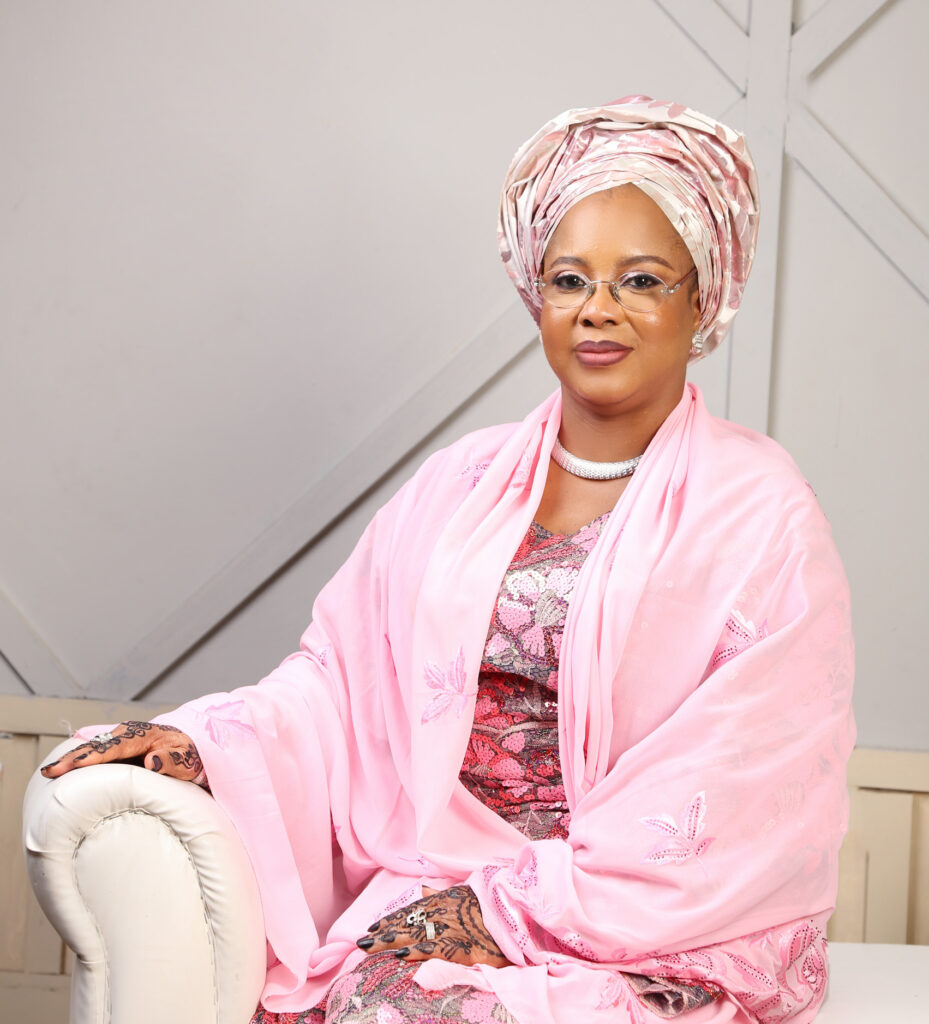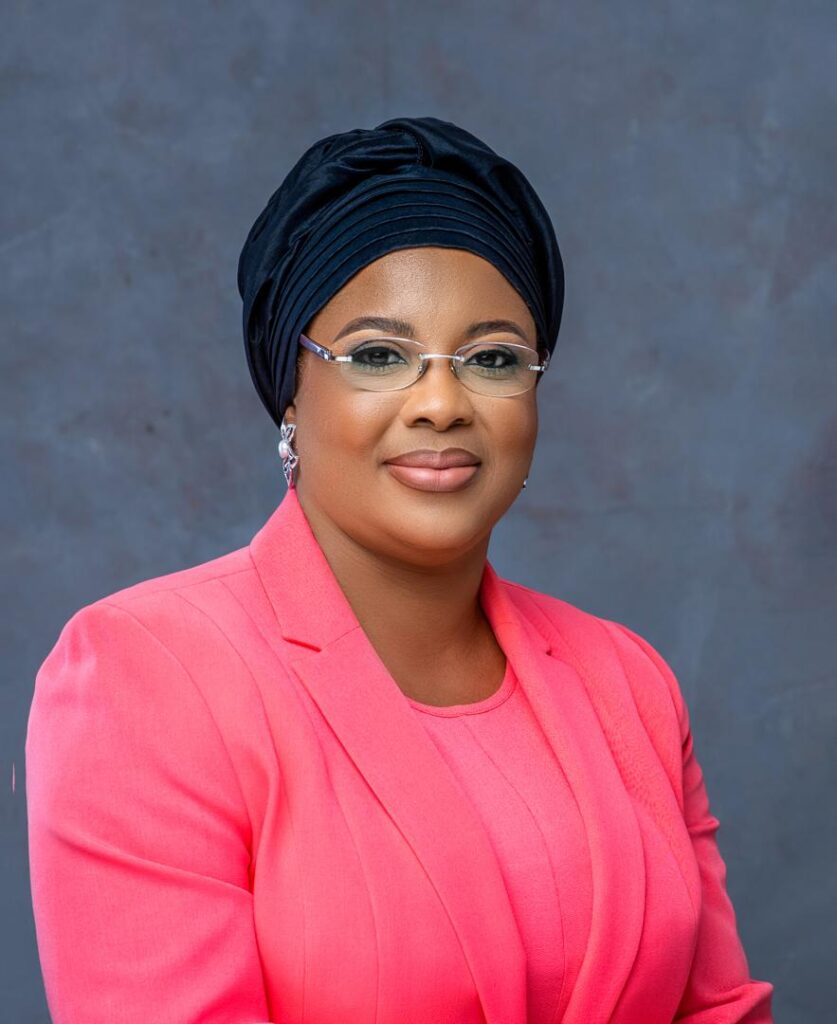
Honourable Kafilat Adetola Ogbara was born to the distinguished family of Alhaji and Alhaja M. Ade Kasumu of Aiyepe in Ogun State. The family is popularly known as Kasumu Onipanla, as her father earned his place in history as the first to introduce stockfish to Nigeria.
From an early age, she exhibited leadership, confidence, and a keen sense of purpose as she played a vital role in the family business at a young age.
Her academic journey began at ADRAO International School, Victoria Island, and Federal Home Science Primary School, Ikoyi, before she proceeded to Federal Government Girls’ College, Langtang, Plateau State, for her secondary school education.
She is a proud alumna of the University of Lagos, where she earned a Bachelor’s degree in English Language and Literature. She further distinguished herself with two Master’s degrees from the same institution one in International Law and Diplomacy and another in Public Administration. She undertook auxiliary nursing training at Aiyepe Group of Hospitals, Lagos, reflecting her deep passion for care and service.
PROFESSIONAL CAREER
Honourable Ogbara began her career in property and facility management within her family business before venturing into the media industry. Her eloquence and charisma led her to television limelight, where she became a presenter on the Nigerian Television Authority’s programme: Faces and Events. Her foray into media extended into print journalism. She served as Managing Director/CEO of the National Mirror Newspaper, and also the publisher of Today’s Prime News, combining her passion for communication with her drive for nation building. Her vast experience across the media, private and public sectors sharpened her administrative acumen, preparing her for her eventual journey into frontline politics.
POLITICAL CAREER
Honourable Ogbara is a thoroughbred politician and women’s rights activist whose political journey spans more than two and a half decades. She began in the People’s Democratic Party (PDP), where she contested the general election as the House of Representatives candidate for Kosofe Federal Constituency Federal Constituency in 2003 and 2007, respectively and later as gubernatorial aspirant in Ogun State in 2011. She also served on several gubernatorial and presidential campaign committees.
She was appointed Special Assistant on Trade and Investment/Technical Aid Corps at the Ministry of Foreign Affairs, Abuja. She has also served as a board member of key parastatals such as the National Centre for Women Development (Ministry of Women Affairs, Abuja), the Horticultural Research Institute (Ministry of Agriculture), and the Nigeria Television Authority, Abuja.
She was appointed by Governor Babajide Sanwo-Olu as a Commissioner in the Lagos State Audit Service Commission. She distinguished herself in that role and driven by her vision to serve at a higher capacity, she resigned from the position to contest the 2023 general elections.
Hon. Ogbara was elected to the House of Representatives as the APC candidate for Kosofe Federal Constituency, securing 45,111 votes to defeat her rivals. With this victory, she made history as the first female House of Representatives member for Kosofe Federal Constituency and the only female federal legislator from Lagos State in the 10th National Assembly.

LEGISLATIVE LEADERSHIP AND IMPACT
Upon resumption in the National Assembly, Hon. Ogbara was entrusted with the role of Chairperson, House Committee on Women Affairs and Social Development, and also appointed as the Southwest representative at the National Institute for Legislative and Democratic Studies (NILDS), alongside her membership in several other strategic committees.
She has since become a fearless voice and a formidable force in the chamber. She has been responsible for transformative constituency programmes and is a recipient of various awards.
What are your roles as Chairperson of the House Committee on Women Affairs and Social Development?
My role includes coordinating, mobilising, and carrying out legislation as it relates to women, children and the vulnerable.
The second is to scrutinise the budget of the Federal Ministry of Women Affairs and the Maryam Babangida National Centre for Women Development (MBNCWD), which includes the Ministry and parastatals under the Committee on Women Affairs and Social Development.
The third is to also be generally concerned about issues of women, their protection and well-being across our country Nigeria, while working in harmony with members of my committee.
What practical steps are you implementing or plan to implement to achieve your goal of ensuring no governance or corporate appointment list excludes the female gender?
The practical steps that I have commenced includes ensuring that most of the bills I have sponsored within the last two years as ‘Chairman of the committee on Women Affairs and Social Development’ have been gender related bills. This is because my first request upon resumption as a member of the House of Representatives was to request for the rejected gender bills in the previous assemblies, hence the reason for my sponsorship of the ‘Reserved Seats for Women Bill.’ I also initiated a bill that will mandate all political parties in Nigeria to compulsorily nominate women during primary elections and that no single gender list should be allowed by the electoral body.
I also recently sponsored a bill that will mandate all security institutions to give at least 15 percent in enlistment, appointment, recruitment and promotion to women including the police force. As we speak, the NSCDC has achieved 35 percent.
This effort is to ensure women’s inclusivity. I have led advocacy on women’s inclusivity to the headquarters of political parties by meeting with their national working committee leadership and advocating for women to hold prominent party positions, to be elected at party primaries, to be appointed for all purposes, and most importantly seek their support for the ‘Reserved Seats for Women Bill.’ I have featured in a lot of public mediums , continuous engagements and appeal to relevant stakeholders through advocacy for women inclusion, hence the inclusion of female councillors in every local government in the last local government elections in Lagos State.
Can you elaborate on the impact of the digital inclusion and empowerment programmes you’ve initiated for women and youth?
We have carried out local community initiatives. Most local organisations run programmes tailored to their communities that focus on providing digital training skills for women and youth. And this I have done by partnering with tech companies and schools. Some of the projects include: School projects, solar-powered boreholes and street lights, viewing/recreational centres, old people’s recreational centre and empowerment programmes for widows, people living with disabilities and other vulnerable members of the society, green farm in Oworo, ICT centres, facilitation of medical outreach programmes, quarterly distribution of palliatives and cooking gas to low income earners and vulnerable.
How do your entrepreneurship and vocational programmes specifically support artisans, traders, and widows?
My vocational and entrepreneurship programmes are designed to equip women for today and future. Hence the reason I empower them with capital, resources and link them to raw materials and markets for their finished products.

How are you promoting the 35% affirmative action for women in governance more effectively?
I do this by promoting gender policies and making legislation that support gender mainstreaming. Like I said earlier, I have sponsored a lot of bills that will increase women’s participation in politics.
Secondly, ‘The Reserved Seats for Women Bill’ is another avenue. We’re strategically pursuing and exploring all avenues by making sure we get the bill passed in this 10th Assembly.
Some of my bills include:
An act to amend the Nigeria police act No.2 2020, to provide at least 15 representation in the recruitment of police officers, which requires that the Nigeria police maintains a gender-responsive compliance programme in the recruitment, training, posting and discipline of police officers, and ensure the establishment of records of the gender-responsive compliance programme, and other related matters.
An act to amend the Nigeria security and Civil Defence corps act cap 146 laws of the federation of Nigeria 2004, to provide at least 15 percent of women representation in the recruitment of members of the corps, require the Nigeria security and Civil Defence corps to provide and maintain a responsive compliance programme in the recruitment, training, posting and the establishment of a unit to monitor and maintain records of the gender-responsive compliance programme; and for related matters.
An act to amend the armed forces act, Cap A20 laws of the federation of Nigeria 2004, to ensure at least 15 percent of women representation in the enlistment, recruitment and appointment of service personnel, require the armed forces to provide and maintain a gender-responsive compliance programme in the enlistment, recruitment, training, provision of accommodation, operational engagements, provision of logistics, marital status, posting and discipline of service personnel, and ensure the establishment of a unit to monitor and maintain records of the gender-responsive compliance programme, and disaggregated data collation for related matters.
An act to establish the National Child Protection and Enforcement Agency, and to provide necessary protection and care for the Nigerian child; and for related matters.
A bill for an act to amend the Violence Against Persons (prohibition) Act, 2015 to increase the penalty for the offence of female genital mutilation under the act and for related matters.
A bill for an act to amend the National Citizen Centre Act, 2017 act No. 24, 2010 to establish senior citizens’ centres and homes for the elderly in all the states of the federation and the federal capital territory, Abuja and for related matters.
You just completed the legislative advocacy webinar on the Reserved Seats Bill For Women(Understanding HB1349) what were the takeaways and what next?
The legislative advocacy webinar was one of the several ways of our advocacy and the target audiences were the youths. It was meant to get the younger generations involved by educating them on what the bill entails and how they can be involved.
Takeaways? I realised that the younger generation are now more politically conscious. They are ready to lead and be in charge.
What next? We have a lot of activities lined up for the month of September. Activities like conferences of speakers summit, technical session with Senate and House of Representative, stakeholders engagement with civil society organisations, dinner with Honourable members and their wives, and a lot of activities.
What are the challenges you encountered (or currently encountering) in pushing for this bill and how can the populace be part of this? What is their role? How can they help?
Nigeria is a deep rooted patriarchal society, so you would expect some region to kick against the bill, but we’re working on getting support from those regions.
The general public can play their roles by adding their voices in support of the bill. They can help by speaking to their lawmakers from their constituencies or writing them letters to support this crucial bill, sending text messages to them and physically engaging them.

Tell us about being the first female House of Representatives Member for Kosofe Federal Constituency and the only female federal legislator from Lagos State in the 10th National Assembly? Share experience and lessons.
The people of Kosofe gave me this mandate and I am grateful for the privilege to serve. For me, service at any level is service to humanity, bearing in mind that my policies must be impactful by being visionary and value driven. I am committed to innovating, adapting and empowering my people even in these turbulent times and to shape a brighter future for the next generation. I love to be with my people all the time. The joy I derive from making them happy cannot be quantified, so it’s always a WIN-WIN when I make the sacrifice to do the things I do.
It’s overwhelming being the only female in the 10th assembly member from Lagos State. Hence the reason I am very particular and deliberate in advocating for increased representation of more women in parliament.
Being the only female federal legislator from Lagos State in the 10th National Assembly shows low representation of women at that level. What are you doing to ensure you represent women appropriately, what can be done to increase more participation by other women and what legacy do you want to be remembered for?
The only way to increase women’s representation in governance is through legislation, and that’s why I am working tirelessly to ensure that all gender bills get the necessary support to become laws. I want to be remembered as the woman who selflessly played the necessary role needed to pave the way for other women to be at the decision-making tables.
How important is collaboration for you in ensuring that your committee is committed to working to advance women’s affairs and social development? How are you addressing them?
The committee is open to meaningful collaboration and cooperation that will advance the cause of women’s rights and representation. We’re collaborating with UN WOMEN, UNDP and other CSO’s.
How can the numbers of women in politics be better improved? For those in there already, what do you have to say to them?
We don’t have enough women in political representation. We have 15 women in the House of Representatives and 4 at the Senate. Nigeria is ranked 179th position globally as the country with the least percentage of women in parliament. Despite the fact that we have a lot of women in politics, sadly, they are rather used as clappers, dancers and singers in the political space. For those women already there at the top, they should speak up and support policies that address these low representation.
What is your honest take on women’s rights and its implementation in Nigeria?
Nigeria is signatory to various international agreements and treaties, but implementation has always been the challenge. There’s the Maputo Protocol, African women’s charter, CEDAW and so on.
How early should girls be encouraged to show interest in politics?
As early as possible, they should begin from secondary schools, SUG in universities. And that’s why I have adopted a mentorship programme for young girls who are interested in politics. I started my political career from the University of Lagos as a student union leader. So, I know the impact of starting young even though I believe that mine is an inbuilt thing. I have the passion for delivery, touching lives and making a difference with vision, resilience and courage.
Do you agree that traditions and norms also contribute to low representation of women in politics? How can this be tackled?
Yes, tradition, culture and religion have also impeded women’s participation in politics. It can be addressed locally through the right information and education. And that’s where our traditional leaders and religious leaders come in. As traditional gatekeepers, we need them to correct the narrative.
What words of encouragement do you have for the Nigerian woman, or girl child?
My word of encouragement would be that nobody should be told what they can or can’t do. When people can’t do something, they discourage others who can. So, for those coming up, remain focused by ignoring detractors, have the fear of God, work hard with determination and believe that nothing is impossible.